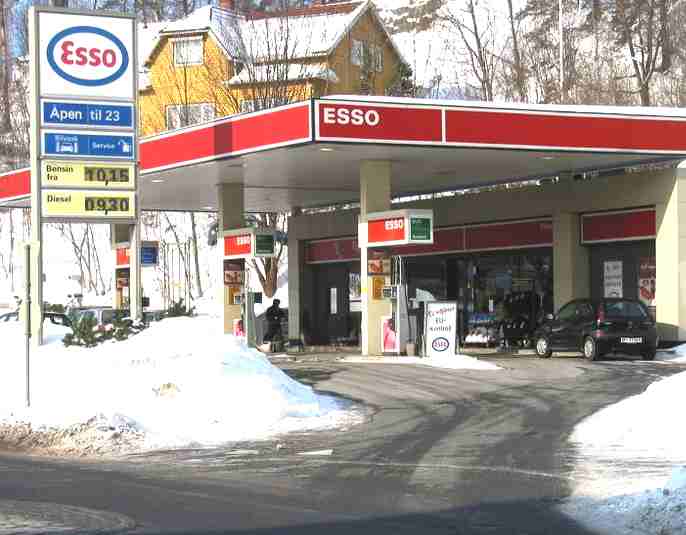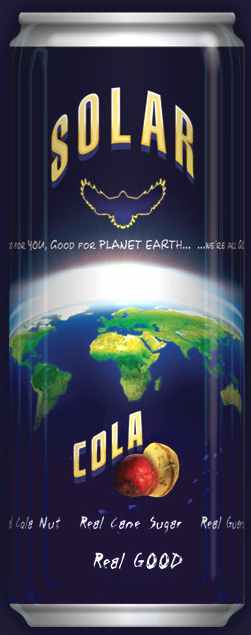Esso (Eastern States Standard
Oil) is an international trade name for ExxonMobil and its related
companies, derived from the initials of the pre-1911 Standard Oil, and as such became the focus of much litigation and regulatory restriction in the United States. In 1973, it was largely replaced in the U.S. by the Exxon brand, while Esso remained widely used elsewhere.
In most of the world, the Esso brand and the Mobil brand are the primary brand names of
ExxonMobil, with the Exxon brand name still in use only in parts of the United
States.

An Esso station in Stabekk, Norway
An Esso gas station signIn 1911, Standard Oil was broken up into seven regional companies, each with the rights to the brand "Standard" in certain states (plus a number of other companies that had no territorial rights). Standard Oil of New Jersey ("Jersey Standard") had the rights in that state, plus in Maryland, West Virginia, Virginia, North Carolina, South Carolina, and the District of Columbia. By 1941, it had also acquired the rights in Pennsylvania, Delaware, Arkansas, Tennessee, and Louisiana. In those states, it marketed its products under the brand
"Esso", the phonetic pronunciation of the letters "S" and "O".
It also used the Esso brand in New York and the six New England states, where the Standard Oil Company of New York (Mobil) had the rights, but did not object to the New Jersey company's use of the trademark (the two companies did not merge until 1998). However, in the other states, the other Standard Oil companies objected and forced Jersey Standard to use other brand names. In most states the company used the trademark
"Enco", and in a few "Humble". The other Standard companies likewise were "Standard" or some variant on that in their home states, and another brand name in other states.
This situation was confusing to travelers. In 1972, Standard Oil of New Jersey renamed itself as the Exxon Corporation, and adopted that trademark throughout the country. It however maintained the rights to "Standard" and
"Esso" in the states where it held those rights, by a token effort, by selling
"Esso
Diesel" in those states at stations that sell diesel fuel, thus preventing the trademark from being declared abandoned.
United Kingdom
Esso Blue
Esso Blue was the brand name of Esso's paraffin oil (kerosene) for domestic heaters in countries such as the United Kingdom. Their TV advertising song from the 1950s through to the 1970s was the famous "Bom, Bom, Bom, Bom, Esso Blue!" A later campaign used the well-known song tune of "Smoke Gets in Your Eyes" cleverly re-worded as "They asked me how I knew, it was Esso Blue ... the non-smoking paraffin".
Cleveland
In the 1930s Esso acquired Cleveland, an independent company based in North East England. The name comes from the Cleveland Hills. Cleveland's products included a benzole blend and an alcohol blend called Discol. Both the Esso and Cleveland names continued in use until 1973, when the Cleveland filling stations were re-branded as
Esso.

Canada
An Esso-branded service station, with On the Run convenience store, in Kanata, Ontario.In Canada, the Esso brand is used on stations operated by Imperial Oil, which is 69.8% owned by ExxonMobil.
In February 2007, a combination of a fire at the Nanticoke refinery and a strike at CN resulted in a shortage of gasoline at Esso stations in Ontario, which also drove up prices and caused shortages in competitor's stations (both in Ontario and neighboring Quebec.)
LINKS
and REFERENCES
Esso
Homepage - redirects to ExxonMobil site
The
Case Against Esso/Mobil
Youtube
Solar
Cola drinkers care about climate chaos
......
.......
Pioneering research for the Planet

The
Future
One
day we may be able to refuel our electric cars at
service stations like
these. This will depend upon progressive energy companies like Chevron cooperating with motor manufacturers
and other energy companies.
Pollution
Oil
derivates are being dumped out at sea. Not only is this a wasted
resource and a recycling failure, but also a danger to marine life and
ultimately to humans
from eating fish
that is toxic. The companies listed below operate responsible policies
that will hopefully be developed to create a circular
economy where ocean plastic
pollution is negligible. At that point we will have reached a
sustainable society to secure the future of our children.
|
COMPANY
A - Z
|
EMPLOYEES
|
$
BILLIONS
|
|
-
|
-
|
-
|
|
ALPLA:
|
17,300
|
3.3
|
|
Аrkema
SA:
|
-
|
-
|
|
BASF:
|
39,000
|
63.7
|
|
Borealis
AG:
|
-
|
-
|
|
Borouge
(Abu Dhabi Polymers Co Ltd):
|
6,500
|
7.2
|
|
Braskem
SA:
|
-
|
-
|
|
ChevronPhillips
Chemical:
|
5,000
|
13.4
|
|
CNPC:(
China
National Petroleum Corp):
|
1,470,190
|
326.0
|
|
Dow
Chemicals:
|
14,000
|
49.0
|
|
DuPont:
|
-
|
-
|
|
Exxon
Mobil:
|
75,600
|
290.0
|
|
ENI
S.p.A. Ente
Nazionale Idrocarburi:
|
33,000
|
61.6
|
|
Formosa
Plastics Corporation:
|
2,800
|
5.0
|
|
INEOS
(Ineos Group AG):
|
19,000
|
60.0
|
|
Lanxess:
|
16,700
|
7.9
|
|
LG
Chem:
|
14,000
|
17.8
|
|
Lyondell
Bassell:
|
13,000
|
33.0
|
|
Polyone
Corp:
|
-
|
-
|
|
Reliance
Industries Ltd:
|
-
|
-
|
|
Repsol
SA:
|
-
|
-
|
|
Sasol
Ltd
|
-
|
-
|
|
SABIC:
(Saudi Arabia Basic Industries Corp)
|
40,000
|
35.4
|
|
Sinopec
|
249,000
|
314.4
|
|
Tosoh
Corp:
|
-
|
-
|
|
Total
SA:
|
-
|
-
|
Amoco
| BP | Chevron
| CNCP
| ESSO | Exxon
| Mobil | Shell
| Texaco | Total


